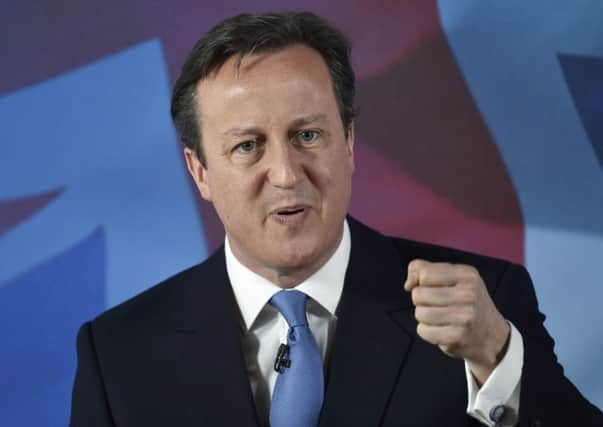Leaders: Cameron should match words with actions


Addressing his top team after their majority victory, he said that all changes to public services must be rooted in “true social justice and genuine compassion”.
Holding a copy of his party’s manifesto, he promised to deliver all of it. Included in the manifesto is a plan to scrap the Human Rights Act. Michael Gove, the new Justice Secretary, will be responsible for the policy.
Advertisement
Hide AdAdvertisement
Hide AdThe Human Rights Act covers the right to life, right not to be tortured or subjected to inhumane treatment, right not to be held as a slave, right to liberty and security of the person, right to a fair trial, right to a private and family life, right to freedom of thought, conscience and religion, right to freedom of expression, right to freedom of assembly and association, right to marriage, and the right not to be discriminated against, among others. And it also imposes the duty on governments to hold free and fair elections. That would seem like a fair start towards true social justice, so if that really is your aim, is starting by scrapping the Human Rights Act the way to go?
Mr Cameron said he valued work and he wanted to create jobs and give people the chance of a job with dignity. He has said his party is the party of the working person.
Yesterday Business Secretary Sajid Javid said the government would change the rules on trade union strike ballots, so industrial action in essential public services would only be lawful if 40 per cent of employees entitled to take part in a ballot actually voted and that he wanted to lift the ban on agency staff being used during walkouts.
So although Mr Cameron wants to create more workers and let more enjoy the value that comes with that, he wants to restrict their rights as workers.
And Mr Cameron said that he would ensure that the state would support those who cannot work.
The new government is about to lower the annual household welfare cap – the maximum amount that any household can receive in benefits – from £26,000 to £23,000 to try to ensure, according to Downing Street, the end of “the something-for-nothing culture”.
And one of the enduring mysteries of the 2015 election campaign was the Tory silence on exactly where £12 billion will be cut from the welfare budget by 2017-18.
Leaked papers that suggested a regional benefits cap and taxing disability benefits were dismissed as not being party policy.
Advertisement
Hide AdAdvertisement
Hide AdIt’s early days yet, but it does look as if Mr Cameron’s words are at odds with some of his policies.
Art for art’s sake, but at a price
Art is meant to inspire us, to have us in awe and to have us ask questions. The first question that springs to any reasonable person’s mind on hearing that Pablo Picasso’s Women of Algiers has become the most expensive painting to sell at auction, going for £115 million, surely has to be: Can any work of art be worth that sort of money?
Then came the sale of Alberto Giacometti’s life-size sculpture Pointing Man, for £90.7m, another record. That is a powerful lot of inspiration.
Of course there are the arguments that anything is only worth what someone will pay for it, and that art is a sensible investment (based on the belief that someone else will believe it is worth more than you paid for it). Accurate though these arguments are, there is something that just does not sit right with works of art obtaining such astronomical sums.
It emphasises the vast difference between the rich and the poor on this planet, and says a lot that those differences are expanding and the prices for art works are going up.
There is often a furore around the art works short-listed for the Turner Prize, usually centring around whether they actually constitute art because often they cannot be hung in a gallery. This year it has been revealed that the shortlist includes a Liverpool housing estate transformed by an art collective, an opera inspired by the violence of cartoons and a collection of fur coats draped over office chairs.
But in some ways, perhaps counter-intuitively, those pieces are more traditional artworks that the Picasso or the Giacometti when it comes to relevance to the people.